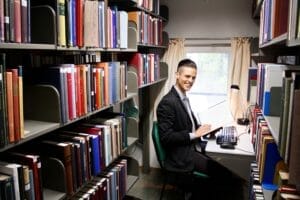 |
Joshua Vera, PhD Student | History
2016-2017 Fulbright U.S. Student Program Fellow in Greece
What drew you to the Fulbright U.S. Student program? What about it seemed like a good fit for you and your work at the time that you were applying?
Initially, I was drawn to apply for a Fulbright Fellowship simply because the program is prestigious and my dissertation project fits the criteria. However, as I further investigated the Fulbright Foundation and its aims, I realized that the Fellowship would allow me to pursue certain personal interests in conjunction with and beyond my professional work. Most particularly, Fulbright places a great emphasis upon community engagement and on making connections between Americans and Greeks across society—that is, outside the academy—which I hoped to achieve during my time here anyway. I feel that too often Americans in Athens, and especially those working in the field of Classical Studies, only really see the ancient city around them and are hesitant to engage with the modern culture here. Fulbright encouraged me to learn to speak Greek and to become involved with living, breathing Greek people, and this has impacted deeply my understanding of their local history.
At this point in the fellowship year, is there a particular experience that stands out to you? Or, something you hadn’t counted on that has since proven important for you or your project?
I think the greatest benefit I have derived from my time here, perhaps even more than access to the archival materials, is the ability to walk frequently on the same ground as the people whom I study, to sit repeatedly where they sat two thousand years ago, to view the landscape around me persistently from the same perspective that they did every day. I had expected that visits to the archaeological sites would be useful for mentally situating all of the maps and diagrams that I have spent hours examining in dark corners of the library, but I underestimated the intellectual and creative dynamism provided in the experience of growing personally familiar with the physical features of this place. In the process, I have stumbled onto important realizations about my current research, but I also have been motivated to pursue new orientations in urban landscape studies that I plan to explore beyond the temporal and methodological scope of my dissertation.
The Fulbright U.S. Student Program is unique in requiring that the project proposal involve a community engagement component. Can you describe how you went about addressing that (both in the application and in practice now that you are in Greece)?
In the application, I proposed that my community engagement would consist of two aspects: volunteer work with the Foundation’s initiative to aid Greek students in applying for American universities, and regular attendance at and involvement in local academic events. While it seems to have been effective for the purpose of the application, they have only called on me once to fulfill the former commitment, when I presented at a U.S. college fair in support of Fulbright Fellowships. The process of finding local events to attend, however, has proven even more fruitful than I expected, and I now must balance my time so as not to spend too many working hours at local talks and seminars. Between the Greek institutions and foreign archaeological schools, there is some kind of academic event occurring every day. Recently, I had the opportunity to present my preliminary findings to an enthusiastic audience at the American School. I therefore have been able to connect with scholars from Greece and also from a range of other European countries, and I have been able to leverage these connections to meet Greeks outside of academia as well. As my language skills improve, I hope to have many more conversations with locals in the next few months!
More about Joshua’s research
Joshua’s research in Athens examines the redevelopment of urban space and the reuse of Classical structures, especially temples, in Athens under Roman control, in order to discern the impact of such projects on local identities. He is identifying the ways the Athenians adapted, adjusted, and acclimated to the new Roman image of their city, as he seeks to establish the extent to which developments in the landscape should be interpreted as a reflection of contemporary cultural priorities.
More about the Fulbright U.S. Student Program Fellowship
The Fulbright U.S. Student Program provides grants for individually designed study/research projects or for English Teaching Assistant Programs. During their grants, Fulbrighters will meet, work, live with and learn from the people of the host country, sharing daily experiences. The program facilitates cultural exchange through direct interaction on an individual basis in the classroom, field, home, and in routine tasks, allowing the grantee to gain an appreciation of others’ viewpoints and beliefs, the way they do things, and the way they think. Through engagement in the community, the individual will interact with their hosts on a one-to-one basis in an atmosphere of openness, academic integrity, and intellectual freedom, thereby promoting mutual understanding.